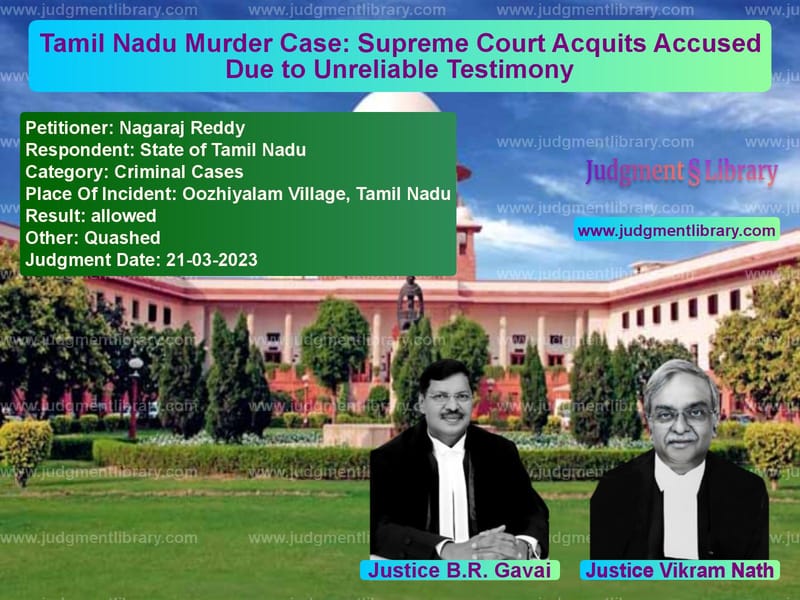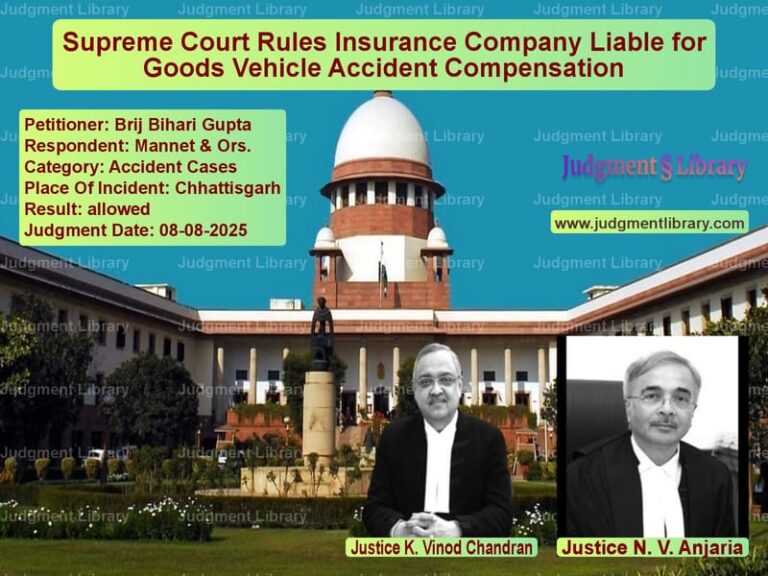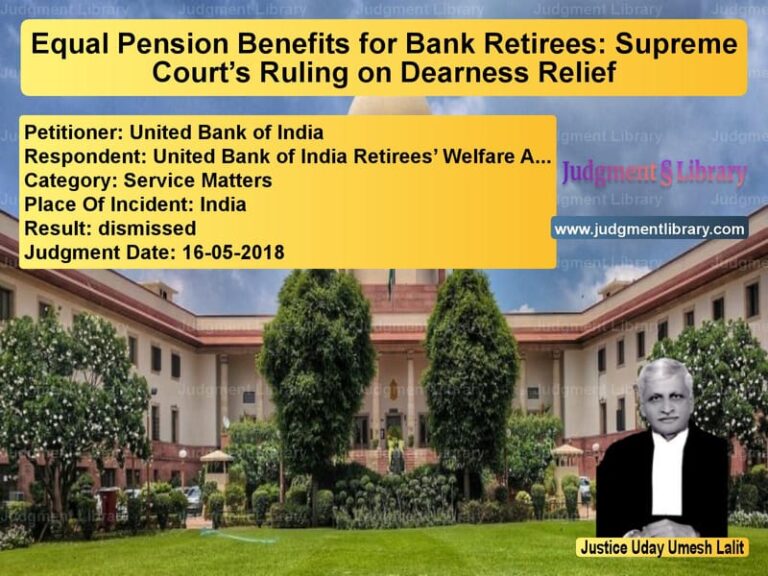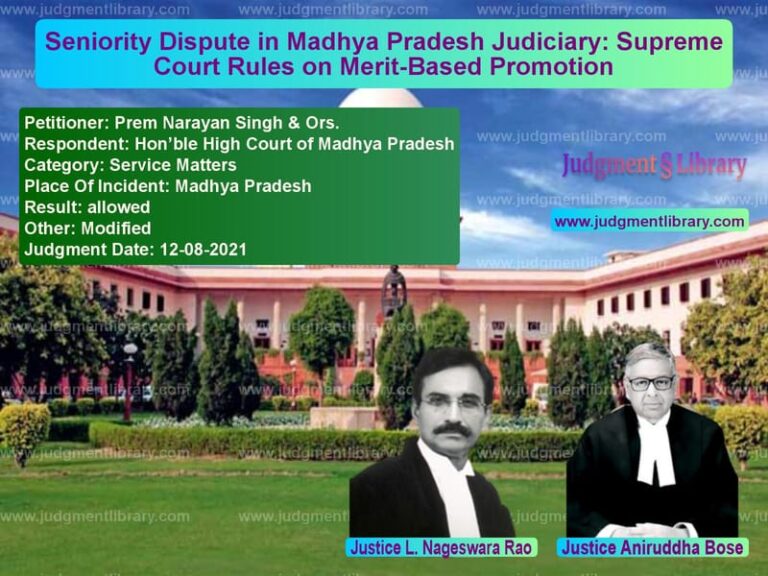Tamil Nadu Murder Case: Supreme Court Acquits Accused Due to Unreliable Testimony
The case of Nagaraj Reddy vs. State of Tamil Nadu revolves around a criminal appeal challenging the conviction under Sections 302 and 341 of the Indian Penal Code (IPC). The Supreme Court’s ruling highlights the importance of reliable testimony and the necessity of corroborating evidence in securing a conviction. The case also underscores the role of previous enmity and its implications in criminal trials.
Background of the Case
The prosecution alleged that the accused, Nagaraj Reddy, along with other individuals, waylaid and murdered Rajappa, a resident of Oozhiyalam village, Tamil Nadu. The case stemmed from tensions between different communities in the village, particularly concerning a dispute over the construction of a compound wall by a local women’s self-help group.
The key events leading to the conviction and subsequent appeal were as follows:
- September 14, 2004: Rajappa and his brother Narayanappa (PW-1) were traveling on a motorcycle when they were allegedly ambushed by five accused individuals, including the appellant.
- Crime Details: The prosecution claimed that the appellant sprinkled chili powder on Rajappa’s face and attacked him with a sickle, leading to his death.
- Complaint Filing: The incident was reported at HUDCO Police Station, and an FIR was registered against five accused individuals.
- December 20, 2018: The trial court convicted the appellant and one co-accused, sentencing them to life imprisonment while acquitting others due to insufficient evidence.
- March 31, 2022: The High Court upheld the appellant’s conviction but acquitted the co-accused, citing inconsistencies in evidence.
- March 21, 2023: The Supreme Court overturned the conviction and acquitted the appellant.
Prosecution’s Case
The prosecution argued that the attack was motivated by prior enmity. The primary witness, Narayanappa (PW-1), testified that the accused had stopped them and launched a brutal assault. The prosecution’s case relied heavily on his testimony, asserting that:
- The appellant threw chili powder on the deceased and attacked him with a sickle.
- The other accused inflicted multiple injuries on the victim.
- After the attack, the accused went back to the village and threatened the victim’s family.
Defense’s Arguments
The appellant challenged the conviction on the following grounds:
- PW-1 was the deceased’s brother and had previous enmity with the accused, making him an interested witness.
- The prosecution failed to present any corroborative evidence apart from PW-1’s testimony.
- The High Court had acquitted the co-accused based on the same testimony, yet it upheld the appellant’s conviction.
- There was no forensic evidence directly linking the appellant to the murder.
Supreme Court’s Judgment
The Supreme Court found merit in the defense’s arguments and ruled in favor of the appellant. The key findings of the Court were:
1. Unreliable Testimony of Sole Witness
The Court emphasized that PW-1’s testimony was inconsistent and lacked corroboration:
“Undisputedly, Narayanappa (PW-1) is an interested witness, being the brother of the deceased. He has also admitted that there existed previous enmity between the parties.”
The Court reiterated that in cases where the sole eyewitness has a vested interest, their testimony must be supported by independent evidence.
2. Acquittal of Co-Accused Based on the Same Evidence
The Court pointed out that the High Court had acquitted one co-accused but upheld the appellant’s conviction on the same set of evidence. This was found to be contradictory and legally unsustainable.
3. Failure to Establish Guilt Beyond Reasonable Doubt
The Supreme Court stressed the principle that the prosecution must prove guilt beyond reasonable doubt:
“Previous enmity is a double-edged sword. On the one hand, it provides motive; on the other, it raises the possibility of false implication.”
Since no other witnesses directly implicated the appellant, and no forensic evidence was presented, the benefit of doubt had to be given to the accused.
4. No Evidence of Absconding
The prosecution claimed that the appellant’s absconding indicated guilt. However, the Supreme Court found that the appellant had surrendered before the magistrate within a few days of the incident. The Court ruled that this could not be used as a sole factor to establish guilt.
Final Ruling
The Supreme Court ruled:
- The conviction and sentence imposed by the trial court and upheld by the High Court were set aside.
- The appellant was acquitted of all charges and directed to be released immediately if not required in any other case.
Conclusion
This judgment highlights the necessity of corroborative evidence in criminal trials, especially when the sole eyewitness is an interested party. The ruling reinforces the principle that mere previous enmity cannot be the basis for conviction without strong supporting evidence. By overturning the conviction, the Supreme Court has reaffirmed the importance of proving guilt beyond reasonable doubt in all criminal cases.
Petitioner Name: Nagaraj Reddy.Respondent Name: State of Tamil Nadu.Judgment By: Justice B.R. Gavai, Justice Vikram Nath.Place Of Incident: Oozhiyalam Village, Tamil Nadu.Judgment Date: 21-03-2023.
Don’t miss out on the full details! Download the complete judgment in PDF format below and gain valuable insights instantly!
Download Judgment: nagaraj-reddy-vs-state-of-tamil-nadu-supreme-court-of-india-judgment-dated-21-03-2023.pdf
Directly Download Judgment: Directly download this Judgment
See all petitions in Murder Cases
See all petitions in Bail and Anticipatory Bail
See all petitions in Attempt to Murder Cases
See all petitions in Fraud and Forgery
See all petitions in Theft and Robbery Cases
See all petitions in Judgment by B R Gavai
See all petitions in Judgment by Vikram Nath
See all petitions in allowed
See all petitions in Quashed
See all petitions in supreme court of India judgments March 2023
See all petitions in 2023 judgments
See all posts in Criminal Cases Category
See all allowed petitions in Criminal Cases Category
See all Dismissed petitions in Criminal Cases Category
See all partially allowed petitions in Criminal Cases Category







